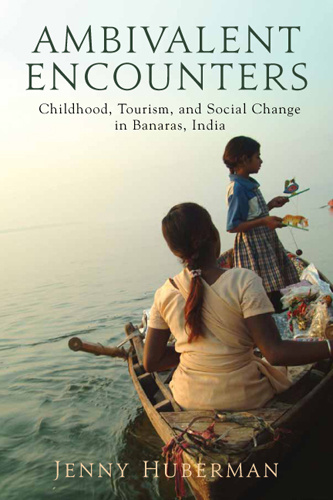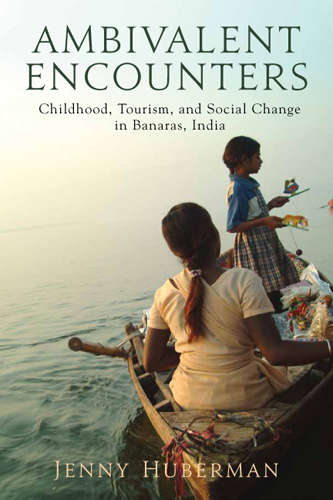
Ambivalent Encounters
Childhood, Tourism, and Social Change in Banaras, India
Jenny Huberman provides an ethnographic study of encounters between western tourists and the children who work as unlicensed peddlers and guides along the riverfront city of Banaras, India. She examines how and why these children elicit such powerful reactions from western tourists and locals in their community as well as how the children themselves experience their work and render it meaningful.
Ambivalent Encounters brings together scholarship on the anthropology of childhood, tourism, consumption, and exchange to ask why children emerge as objects of the international tourist gaze; what role they play in representing socio-economic change; how children are valued and devalued; why they elicit anxieties, fantasies, and debates; and what these tourist encounters teach us more generally about the nature of human interaction. It examines the role of gender in mediating experiences of social change—girls are praised by locals for participating constructively in the informal tourist economy while boys are accused of deviant behavior. Huberman is interested equally in the children’s and adults’ perspectives; her own experiences as a western visitor and researcher provide an intriguing entry into her interpretations.
Download the open access ebook here.
Huberman provides profound insights on the lives of children who work the streets of the tourist industry, and equally profound insights on the experience of tourists and their search for meaning and self understanding in India.
A useful contribution to our understanding of interactions with children that take place in the context of tourism, and of children’s economic
activities more generally.
Through her research on tourist-child encounters in Banaras, Huberman makes a real contribution to the ethnographic and psychological literature on working children and changing gender systems in India.
Ambivalent Encounters is one of the most ethnographically detailed and multifaceted books on children. Huberman expertly captures and explores relationships between value, age, and work in a contemporary Indian city.
Huberman provides profound insights on the lives of children who work the streets of the tourist industry, and equally profound insights on the experience of tourists and their search for meaning and self understanding in India.
A useful contribution to our understanding of interactions with children that take place in the context of tourism, and of children’s economic
activities more generally.
Through her research on tourist-child encounters in Banaras, Huberman makes a real contribution to the ethnographic and psychological literature on working children and changing gender systems in India.
Ambivalent Encounters is one of the most ethnographically detailed and multifaceted books on children. Huberman expertly captures and explores relationships between value, age, and work in a contemporary Indian city.
Acknowledgments
Note on Translation and Transliteration
PART 1: Introductions
1. Children, Tourists, and Locals
2. A Tourist Town
PART 2: Conceptions of Children
3. Girls and Boys on the Ghats
4. Innocent Children or Little Adults?
5. The Minds and Hearts of Children
PART 3: Conceptions of Value
6. Earning, Spending, Saving
7. Something Extra
8. Money, Gender, and the (Im)morality of Exchange
9. Conclusion
Notes
References
Index







